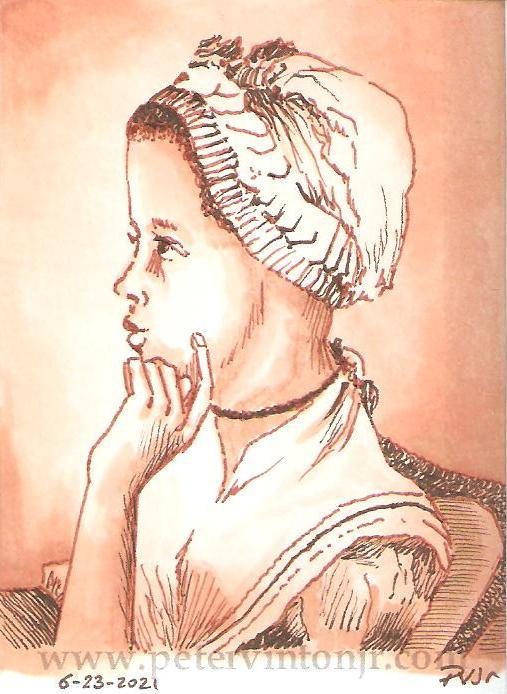
An ongoing illustrative history study
This piece originally posted 7/3/2021
Prelude | 91 | 92 | 93 | 94 | 95 | 96 | 97 | 98 | 99 | Email |
|---|
"Britannia owns her Independent Reign,
Hibernia, Scotia, and the Realms of Spain;
And Great Germania's ample Coast admires
The generous Spirit that Columbia fires.
Auspicious Heaven shall fill with fav'ring Gales,
Where e'er Columbia spreads her swelling Sails:
To every Realm shall Peace her Charms display,
And Heavenly Freedom spread her gold Ray."
A name from the mid-1770's that you almost certainly didn't know: Phillis Wheatley.
Born in Senegal in 1754, Phillis was enslaved at the age of eight and brought to the American colonies as the property of Susannah and John Wheatley. The Wheatleys recognized her innate talent for languages and taught Phillis to read and write, in both English and Latin. In her teens, Phillis managed the unthinkable for someone of her age and station at that time: she published "Poems on Various Subjects, Religious and Moral" --the first-ever African-American woman to publish a book of poetry in the Colonies (though the actual publisher was Archibald Bell, of England).
Scandal almost immediately erupted around the publication; by 1772 Phillis found herself a cause célèbre for Abolitionists from Boston all the way to England. She and the Wheatleys found themselves in the unusual position of having to defend her work; as the prevailing attitude of the times could not imagine the possibility of intellectual or aesthetic gifts in Africans. Religious themes permeated much of Phillis's early work, although there was an unmistakable romanticism of the notion of America as its own nation (which she would repeatedly refer to as "glorious Columbia").
Wheatley's work and reputation ultimately brought her into correspondence with a number of Revolutionary leaders and Founders, to include George Washington (who she actually met), John Hancock, Thomas Hutchinson, and (significantly) Benjamin Rush, one of the signers of the Declaration of Independence. Conversely Thomas Jefferson was dismissive of her work, stating it to be below the dignity of literary criticism. Generations later the nascent Civil Rights movement of the 1960's would also be critical of her work, due to some of its recurring religious themes that lent weight to the notion of slavery as somehow being a noble path to a soul's salvation (common Biblical folklore held that Africans were the "seed of Cain").
After the Revolution, Wheatley was emancipated and lived in Wilmington, Massachusetts. She married and had 3 children, none of whom survived infancy. She had set about trying to find a publisher for a second collection but was unsuccessful, and died at the age of 31. An actual American edition of her published poems would not appear until 1786 --two years after her death.
For further study:
https://greatblackpoets.wordpress.com/2019/03/04/phyllis-wheatley-the-african-genius-whose-poetry-set-her-free/
https://www.thevintagenews.com/2017/03/16/phillis-wheatley-the-first-published-african-american-female-poet/
Next page - Lesson 96: Ida M. Bowman Becks